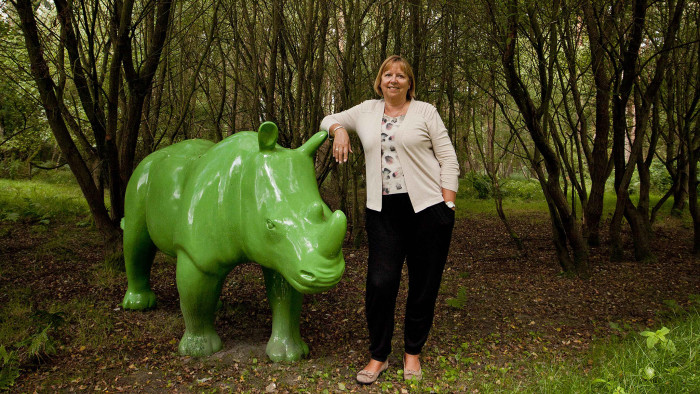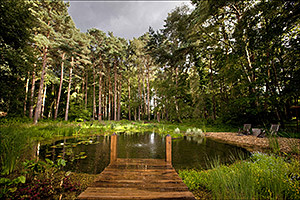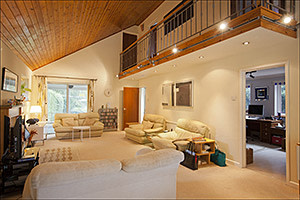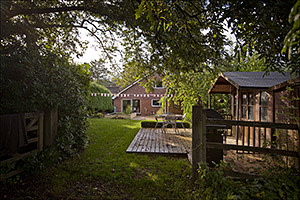Web pioneer Dame Wendy Hall on the future of the internet

Simply sign up to the Life & Arts myFT Digest -- delivered directly to your inbox.
Welcome to our mini safari park,” beams Dame Wendy Hall as she leads the way into her three-acre woodland garden on the edge of the New Forest in southern England. “There are the giraffes, and here’s Rosie the rhino. There’s a hippo floating around somewhere, too . . . We got our inspiration from South Africa’s Kruger National Park and wanted to bring some of that drama back to our own piece of forest.”
Hall is no ordinary zookeeper. Thankfully, the full-size rhino does not present a threat because it is bright green and made of plastic. It means Hall is free to relax in her summer house and talk about a subject close to her heart: the future of the web and the internet.
Hall, 61, a professor of computer science at the University of Southampton, is well placed to comment. Ten years ago, alongside internet pioneers Tim Berners-Lee and Nigel Shadbolt, she established a new academic discipline: web science. Now she works with economists, lawyers, cognitive scientists, historians, computer scientists and experts from many other fields to understand what happens when global networks of humans interact with global networks of computers. Their grand aim is to chart the frantically paced evolution of internet-based technologies. They want to predict where it is going in the future and what it means for how we live and interact.

Electric-blue dragonflies zip over the surface of Hall’s freshly dug 10-metre wide pond – “definitely deep enough for a dip” – as she recalls her first encounters with computers. The early signs were not encouraging. During her mathematics degree in the early 1970s she had to tussle with punch card-programmed mainframes – “awful things,” she says. As home computers became more powerful and user-friendly, she quickly spotted their huge potential and acquired the skills to program and master them.
Favourite thing

“I’m a Scorpio Dragon,” says Hall with a twinkle in her eye. “That’s a very intense combination”. Her friend and colleague in China clearly recognised this fact in giving her this Liuli crystal dragon. “Isn’t it beautiful?” says Hall. “You can see how the sunlight flows through it and all the colours change.”
Even before the hardware could cope, she was certain the future lay in merging multiple streams of information by linking video, text and images on screen. By the end of the 1980s, just as Berners-Lee was floating the first plans for the world wide web, Hall’s research group at Southampton university had developed Microcosm, their own similar hypermedia system. It was the web that ultimately took the world by storm, but Hall has been at the forefront of developments in that sphere ever since. No surprise, then, that in 2009 she was made a dame for her services to science and technology.
A heavy shower drives us back up the long garden to the house she shares with her husband, Pete, who recently retired as a physics professor. It stands in the village of West Wellow, a few miles outside Southampton, the city where Hall has spent almost all her working life. She leads the way through large sliding glass doors and into an expansive open-plan living space that dominates the asymmetrical, A-frame, 1972-built house. The bedrooms are reached from a mezzanine balcony above. Two wooden giraffes, purchased from a roadside stall in South Africa during one of Hall’s frequent trips abroad, peer over the banister. The walls are decorated with abstract paintings in grey and yellow, photographs of the couple’s patch of woodland and intriguing telescope images of the stars made by fellow Southampton professor Greg Parker.

She settles on a comfortable cream leather sofa to continue the discussion. Hall is visibly excited by the huge promise of internet technology to deliver better education, healthcare, transport and commercial opportunities. She is also relaxed about increasingly sophisticated devices becoming incorporated into our own bodies. “I’m sure we’ll end up with chips in the brain.” It follows that she is an enthusiastic adopter of new technologies. The interview is punctuated by rapid fact checking and image-finding on her smartphone. However, Hall also recognises the need to turn off; each year she spends a week in rural France with her husband without access to the internet. Admittedly, she says, it is “actually a real pain” these days to be offline for a whole week.
Although she is a “glass half-full person” by nature, Hall is not blind to the dangers of the world’s ever growing reliance on computer networks. Online privacy, loss of control over personal data and the omnipresent threat of cyber crime and cyber terrorism concerns her deeply. “I liken it a bit to climate change: we all know there’s a problem and there will have to be huge international, national and personal efforts to sort it all out.” Hall is part of the new Global Commission on Internet Governance and the surveillance review ordered by UK deputy prime minister Nick Clegg. She stresses that it is not in the interests of the Googles and Facebooks of this world to create products that the public are too frightened to use. With a bit of luck, she is right and we are not doing too little, too late to avert the looming crisis.
Hall walks into her compact office that looks out on to the garden. There is a conspicuous absence of a computer on her desk, but she draws a sleek laptop from her handbag and sets it on the glass surface. Like the rest of the house there are surprisingly few books on display. “We love to read but have chucked most of them and gone digital,” she says. The couple’s large CD collection survived the chop. They don’t listen to the discs any more, favouring downloadable files, but they consider the collection “a bit of an artwork that contains our shared history”.
Music is important to Hall. She loved being a teenager in London in the swinging ’60s and still doesn’t “like everything being silent”. She wishes she could find more time to play the black piano that takes up almost half of her small office.
She walks back into the living room via a well-equipped kitchen with cherry-red cupboard doors. Apart from a well-used coffee machine, the kitchen is spotless. “I love cooking but don’t have much time for it these days.”

Hall, who chose not to have children so as to focus on her career, is not at all interested in playing out traditional gender roles. Moreover, she is exasperated by the fact there are still so few women in computer science.
“Big data, the web of things, the internet: it’s all very masculine. Women are 50 per cent of the users, so why aren’t they part of its design?” she asks. She is increasingly passionate and outspoken on the subject of gender equality in science and technology, but is wryly aware that as she devotes more of her prodigious energy to the issue, her male contemporaries are free to push on and further widen the gap that she wants to eliminate.
Hall suddenly worries that the music coming from the high-tech sound system might be interfering with the recording of the interview. But she can’t make it stop and has to ask Pete for help. “It’s streamed, dear,” he says with mock condescension.
Computer scientist she may be, but Hall is no geek. The fact that she doesn’t obsess over technical details may be key to her success. Hall’s career has transported her from a PhD in an esoteric branch of mathematics to “the more fluffy end of computing”. In imagining a future where the internet and all the technologies built up on it serve mankind benignly and productively, Hall is willing to think outside the box. “I’ve always got my inspiration from the great science fiction writers: they don’t worry about how.”
Photographs: David Sandison
Comments